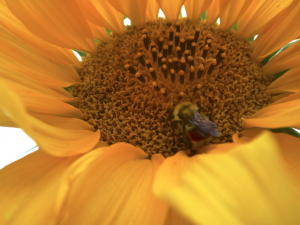 This time last year, I was assessing my bee hives to see if they were strong going into winter. I don’t have any hives this year due to a very hungry bear who visited our yard last October and pretty well cleaned out all the bees, larvae and comb (easy, quick and delicious protein–thankfully leaving our top bar hives intact!).
This time last year, I was assessing my bee hives to see if they were strong going into winter. I don’t have any hives this year due to a very hungry bear who visited our yard last October and pretty well cleaned out all the bees, larvae and comb (easy, quick and delicious protein–thankfully leaving our top bar hives intact!).
This check means looking at the comb for the honey stores, seeing how adequate the mass of bees (and larvae) is and then closing up the front of the hive to reduce the entrance for the unwanted critters–mice and wasps, who feed on bees and their presence indicates a weak colony.
I was working with an experienced beekeeper friend who, when we entered the hive, suggested that in-fact the queen was old (no signs of larvae) and might need to be replaced or “re-queened”. Uggh, I thought. I hate messing with nature–do I really have to? The combs had some honey in the top but were definitely not full. I see no choice. My form of beekeeping has always been more conservative, leaving what honey is in there for the bees and opening up the hive in early spring and late fall as a minimum. Opening up the hive has been spoken of as similar to a human having major surgery. Anyhow, a less is more approach is what I have adhered to. Each year, I find I am faced with the decision to combine hives or let it be and hope that they will make it until they find the dandelions of springtime.
Our family has had between one and three hives for the last seven years. I felt compelled to get a hive when I first learned how important honey bees are to our food supply and, over the years, I have learned a great deal about what amazing spiritual sun beings these pollinators are–responsible for about 80% of our food supply according to some sources! Without them we starve. I have also learned how some of the beekeeping practices around the country contribute to stressing the empathic bees, whether that be shipping them cross country to pollinate the mono almond crops or the use of some of the hives that exclude the drones and come complete with the pre made comb for maximum honey production. This takes away the bees’ efforts or will to create their own comb. Pesticides/fungicides and other chemicals interfere with their orientation and increasingly are blamed for their mass deaths or Colony Collapse Disorder. The statistics and trends are alarming. The bees are our “canaries in the coal mine”–alerting us to how our practices are having dire impact on the species and will affect us as well. They are asking for our love and attention and for us to wake up!
So, last year I was stretched by following a lead to a beekeeper’s house to get a queen. I was instructed to “kiss and kill”. What is “kiss and kill”, I wondered? Well, I learned that I was to reenter the hive and smear the old queen against the box that the new queen was in and to leave it in the hive for a few days. This act would inform the worker bees that their queen was dead and that they would then be able to accept a new queen. Risky, but what was my choice? So, with a little prayer and some courage, I followed instructions and came back a few days later to release the new queen and see how they would fare. It seemed to work, until the bear incident.
To work with these beings is quite a practice for me because I can not approach them if I am rushed or distracted in any way. I am also looking for signs that they are happy and that my moves do not cause them alarm or agitate them. I can tell by the increasing buzz or the more frequent visits of the guard bees to stop and return another day. I am suited up always…with long hair, I am not particularly interested in being stung. One sting and the girl loses her life AND this can often trigger a hive response that it is under attack and justify more stings where that one comes from (male bees or drones don’t sting).
I feel called to do my part to ensure that the bees are well fed (I planted lots of bee loving plants), are welcome in my yard, and are cared for in the best way possible. Beautifully, I have found that the bees feed me as much as I do them!
